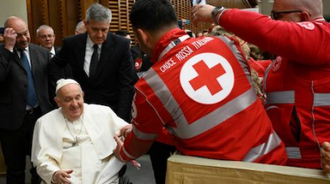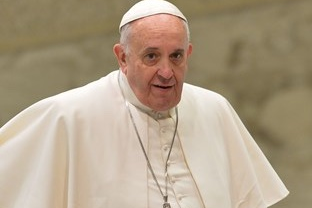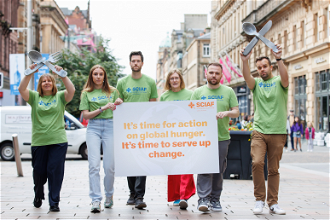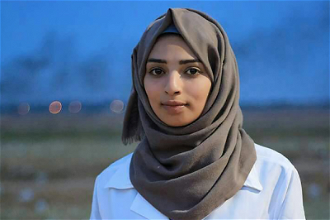Pope calls for prayers for humanitarians risking their lives

Pope Francis meets Italian Red Cross volunteers. Image: Vatican Media Divisione Foto
Source: Vatican Media
As the international community marked World Humanitarian Day (WHD), on 19 August, Pope Francis invited everyone to pray for humanitarian workers, "especially for those who have died or been injured while helping people affected by wars and disasters."
The UN's international Day has been observed globally every year since 2008 to pay tribute to all those volunteers risking their lives to provide humanitarian aid throughout the world, and to commemorate those who have died, or have been injured while working for humanitarian causes and needs.
In a post on X on Monday, Pope Francis remarked that: "Humanitarians show that we can be 'fratelli tutti' by taking care of others."
With armed conflicts increasing in several parts of the world, the death-toll of humanitarian workers is also dramatically rising.
2024 is likely to be the deadliest year for humanitarians on record, particularly for those based in their own countries. 192 humanitarian workers have already been killed this year, 119 of whom were local staff.
As recorded by Caritas Internationalis, www.caritas.org/2024/08/record-humanitarian-worker-death-toll-what-can-eu-do/. the Catholic Church's charitable arm, this dramatic increase is due overwhelmingly to those killed in Gaza following Hamas's rampage on Israel's southern border on October 7, with a total of at least 274 humanitarians killed in the last 10 months.
The number of humanitarians killed in the last 10 months in the Gaza Strip alone is higher than the total deaths of humanitarian workers around the world in the two years between 2021 and 2022.
Caritas has also tragically lost two national humanitarian workers in the Strip: Viola, a lab technician was killed with her husband and infant daughter during the Israeli raid on the St. Porphyrios Orthodox Church in Gaza in October, and Issam Abedrabbo, a dedicated pharmacist and father, aged 35, was killed with two of his sons, leaving one daughter an orphan.
These deaths are far from accidental, says Jean-Yves Terlinden, International Cooperation and Humanitarian Director for Caritas Belgium, recalling that Israeli forces have reportedly carried out at least eight strikes on humanitarian workers' convoys and premises in Gaza since October 2023.
"These attacks," he noted, "occurred in spite of the fact that humanitarian agencies had provided their coordinates to the Israeli authorities to ensure their protection."
According to Caritas Internationalis, this unprecedented loss of humanitarian workers "has been compounded by a humanitarian system that is increasingly affected by political priorities."
It pointed to the EU and US ongoing military support to Israel, "including bombs that have resulted in the deaths of civilians and humanitarians in staggering numbers as well as other forms of material support."
This despite the US and all members of the European Union having signed the UN Arms Trade Treaty (ATT) obligating member states to monitor arms exports and ensure that weapons don't cross existing arms embargoes or end up being used for human-rights abuses.
As confirmed on Monday by Amnesty International, (see: www.amnesty.org/en/latest/news/2024/08/global-governments-brazen-flouting-of-arms-trade-treaty-rules-leading-to-devastating-loss-of-life/ ) since the ATT entered into force almost a decade ago, some of the world's biggest arms exporters are continuing to openly disregard its rules through unlawful arms transfers, leading to a devastating loss of life in conflict zones, including Gaza.
The Catholic charitable network therefore urged particular EU state members to "live up to their values as principled humanitarian actors and to avoid being complicit in International Humanitarian Law violations" by divesting from military support to actors who violate it.
"Without this divestment, humanitarian diplomacy will continue to be undermined by states that on one hand condemn violations of IHL and on the other provide military and economic support to parties that perpetrate these IHL violations," the statement said.
Caritas further recalled that it is increasingly national humanitarian staff who are at risk. A 2024 Humanitarian Outcomes and Global Interagency Security Forum report reveals that the number of casualties experienced by national and local organisations has increased steadily over the past seven years and, in 2022, surpassed that of international NGOs.
However, the deaths of national humanitarian workers, many of whom are employed directly by or work as close partners of international donors and organisations, receive significantly less media coverage than those of international humanitarian workers.
Caritas Internationalis hence called upon the EU for effective measures and more financial resources to ensure their safety, for accountability for those killed in the line of duty, and for "heightened media and political attention for the situations of local humanitarian workers."
"In this way," the statement concluded, "we can help to protect those who dedicate their lives to helping those in their own communities."
Among other critical areas where humanitarians have paid the ultimate price this year, along with civilians, are the conflict-torn Eastern Provinces of the Democratic Republic of the Congo, where six humanitarian aid workers were killed and 11 kidnapped between January and June this year, with more than 200 incidents directly targeting humanitarians in the field.
In a message for Monday's observance, Humanitarian Coordinator in the Democratic Republic of the Congo, Bruno Lemarquis, lamented that "despite the seriousness of these killings and suffering, the world has not shown enough outrage at this catastrophic situation."
He also noted that while the United Nations and local and international NGOs remain more committed than ever to providing the necessary aid to those affected by these crises, the Humanitarian Response Plan for 2024 is only 35 percent funded as of today, which means that hundreds of thousands of vulnerable people are being left behind and therefore called for more donations.
The World Humanitarian Day (WHD) was established five years after the bomb attack on the Canal Hotel in Baghdad, Iraq, which in 2003 killed 22 humanitarian aid workers, including the UN Special Representative of the Secretary-General for Iraq, Sergio Vieira de Mello.
The theme chosen for this year's observance is "Act for Humanity" and is a call to action.
"We must act to protect civilians and humanitarian workers from violence; we must act against impunity for the perpetrators of atacks on humanitarian workers and civilians," said Mr Lemarquis. "When we fail to protect civilians and humanitarians, we fail to uphold the fundamentals of human rights, we fail to relief the people in distress."


















